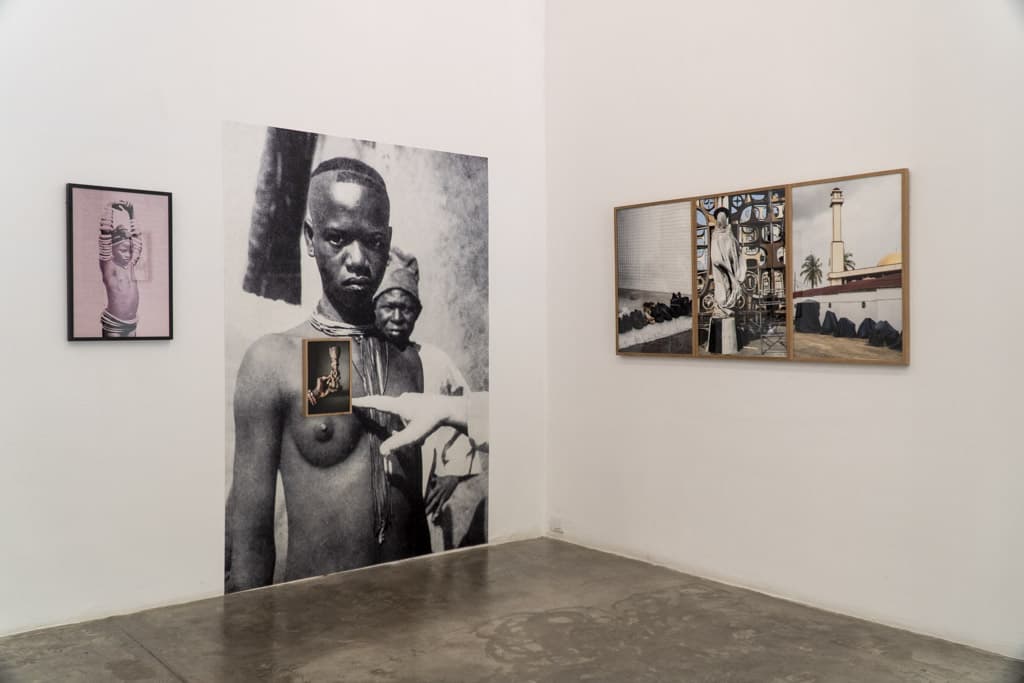Gloria Oyarzabal – Woman Go No’Gree

Gloria Oyarzabal – Woman Go No’Gree
Empires, by their very nature, embody and institutionalize difference, both between metropolis/colony and between colonized subjects. The “Scramble of Africa” (1880-1914), based on a deplorable and fierce imperial competition for the need of raw materials, on the exploration of the world and science on the back of a rising rationalism, and on an ethnocentrism that hierarchized races on the basis of a supremacist ideology, justified the occupation and exploitation of an imperialism that brought light to the darkness that reigned on the African continent, under the pretext of bringing the 3 C’s: commerce, Christianity and civilization. Paternalistic excuses paved the way for the prevalence of present-day dependence, reinforcing the degrading scale of classification according to evolution, thus making the argument of the inferiority of the primitive justifiable. Social Darwinism.
Gender categories were a bio-logical “new tradition” that European colonialism institutionalized in most African cultures. In “Invention of Women: Making an African Sense of Western Gender Discourses. An African Perspective on Western Gender Discourses” the controversial Nigerian feminist writer Oyèrónkẹ́ Oyěwùmí, questions the rational theoretical frameworks that construct gender categories in a universalist manner, thus deconstructing the colonial dynamics of feminisms themselves, positing – among other issues – that before colonization in the Yoruba society privilege and social practices (division of labour, professions and monarchical structures) were not associated with gender but with age or lineage.
The infantilization of women was also exported as part of Western patriarchy through the colonization of the mind; a subtle and alienating practice that, many times, those who carry it out in the various levels of daily life, do so in the name of a “superior” morality, values and customs. Language, manipulation of thought, invasion of privacy, canons of beauty, concepts of modernity and wellness, monotheistic religions,…..
One consequence of Eurocentrism is the racialization of knowledge: Europe is represented as the source of knowledge and Europeans, therefore, as thinkers. This also affects the canons of beauty that are often constructed with strongly racialized Eurocentric narratives and values (thinness, youth and whiteness…), thus reinforcing, once again, the negative, denigrating and stereotyped image of African women. Whiteness as the norm, while “otherness” becomes fetish, something “exotic”.
Socially and politically constructed, the concept whiteness does not simply refer to skin colour: it is an ideology that reinforces the power of some at the expense of others, strengthening systems of oppression.
Power is the ability not only to tell another person’s story, but to make it that person’s definitive story.(…).
The single story creates stereotypes, and the problem with stereotypes is not that they are false, but that they are incomplete. They make one story become the only story.
The Danger of the Single Story, 2016
Chimamanda Ngozi Adichie
Sexuality, eroticism, beauty canons, modernity, sorority, motherhood, marriage, tradition, domestication, inclusivity, violence… all these aspects, with their lights and shadows in every society, should come to light at the same level if we want to compare. Are social relations in all societies organized around biological sexual difference?
In 1987, as queer theory was gaining prominence and reasserting itself in Western thought, Nigerian writer Ifi Amadiume wrote “Male Daughters, Female Husbands,” in which she examines the structures of African society, primarily her own Igbo-nobi sociocultural system, establishing that among the Nobi, sexual duality was mediated by a flexible gender system of culture and traditional language. He asserts that biological sex does not always coincide with ideological gender, roles were not rigidly masculinised or feminized and, consequently, there was no stigma in breaking away from them. The position of “husband” is thus detached from its link to manhood and other attributes of masculinity. Sex, gender and sexual orientation are dislocated. Can a daughter be considered as a son or vice versa in terms of social and family roles? Can a woman take another woman as a wife, openly fulfilling all the requirements that the marriage tradition imposes on the groom? without relating it exclusively and necessarily to sexual roles, but to those of a fluid and flexible family structure of companionship and care. This certainly clashed with the notions established by Western social structures and the Christian religion.
Rethinking gender as a Western construction: decolonize feminism(s), stereotypes, questioning the construction and universalization of gender categories. Perhaps by knowing and understanding History we can overcome social bonds based on gender difference, thus opening the range to other factors for the construction of identity. Let us desire new ways of relating the genders, new models of intercultural dialogue not based on supremacy or an exclusionary hierarchy. Utopia or feasible reality?
The title “Woman Go No’Gree” is the chorus of the song Lady by Fela Kuti (1938-1997), creator of the Afrobeat musical genre, symbol of resistance and activist in the 70s-80s during the dictatorship in Nigeria. Lady is an ambiguous song that raises the question of the emancipation of African women without following Western models.
Gloria Oyarzabal
Press:
– Descolonizar África desde el feminismo. Mª Ángeles Cabré. M-arte y cultura visual